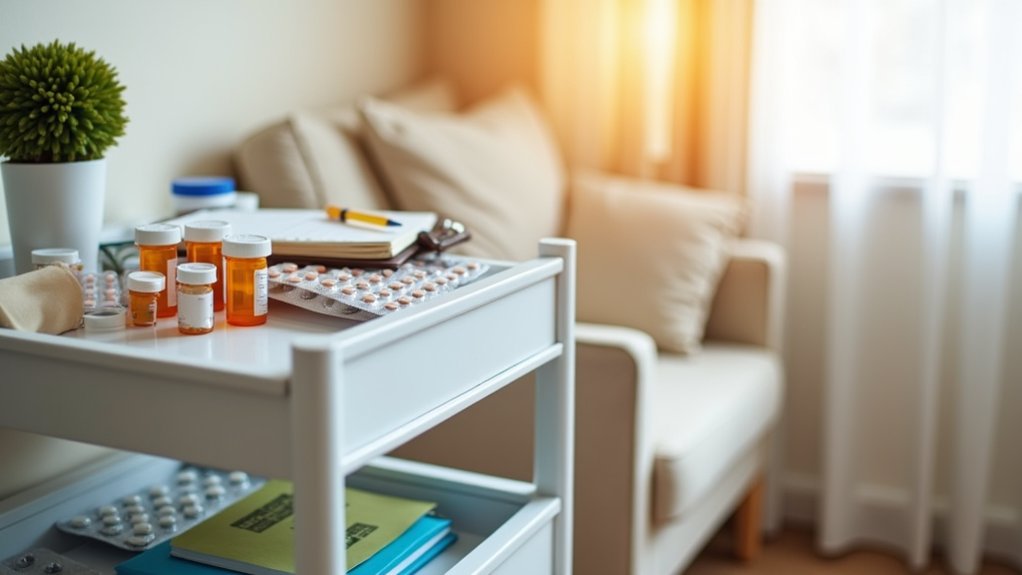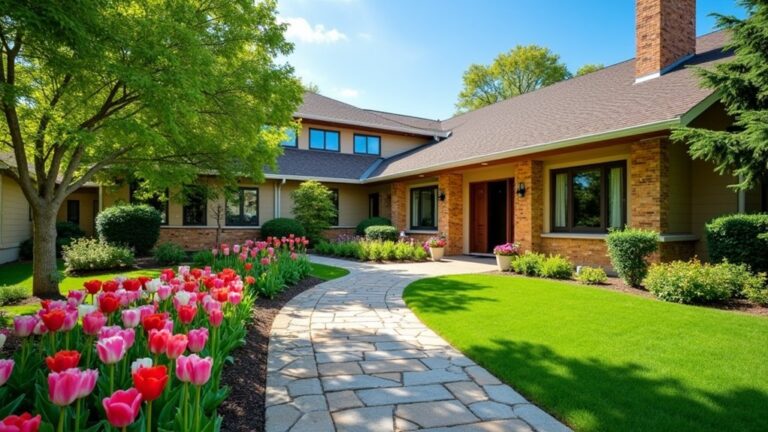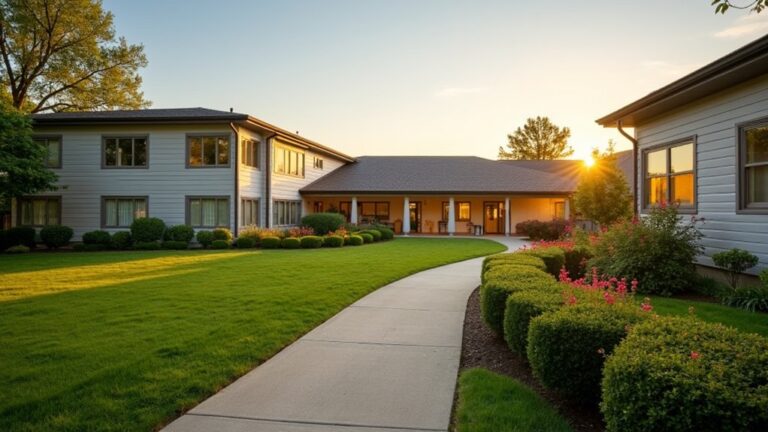Essential Medical Services in Residential Care Homes

When you’re looking into residential care homes, you’ll find essential medical services as the core of daily support. You’ve got skilled nurses handling health needs, medication management ensuring proper dosages, and emergency response systems for urgent situations. Regular health assessments catch issues early, while mental health support tackles loneliness or anxiety. Preventive care, like screenings and exercise programs, keeps you thriving. Stick around to uncover more about how these services safeguard your loved ones.
Key Takeaways
- Health support by skilled nurses monitors vital signs and manages chronic conditions daily.
- Medication management ensures accurate dosages and prevents errors through detailed records.
- Emergency response systems include accessible alarms and staff training in CPR.
- Regular health assessments catch issues early with routine exams and screenings.
- Mental health support addresses loneliness and anxiety through counseling and activities.
Overview of Health Support in Care Homes

As you step into the world of residential care homes, you’ll quickly notice that health support forms the backbone of daily life for residents. You’re not just a caregiver; you’re an essential part of ensuring their well-being.
Every day, you’ll assist with medication reminders, helping residents stay on track with their treatments. You’ll monitor their crucial signs, catching any subtle changes that might need attention. Your role also includes coordinating with healthcare professionals to keep care plans updated and effective.
Beyond the basics, you’ll provide emotional support, listening to residents’ concerns and offering comfort during challenging times. You’ll help with mobility, ensuring they move safely and maintain independence.
Your keen observation skills will spot potential health issues early, making a real difference. By serving with compassion, you’re fostering a nurturing environment where residents feel valued and cared for every single day. Additionally, you may coordinate with trained staff for personalized care plans to ensure that each resident’s unique needs are met effectively.
Availability of Nursing Care Services
Let’s explore the role of nursing care services in residential care homes, building on the foundation of health support you already provide.
As someone dedicated to caring for others, you understand the importance of having skilled nurses available. They’re crucial in addressing residents’ daily health needs, offering personalized attention that enhances well-being.
You can rely on nurses to monitor essential signs, manage chronic conditions, and provide wound care, ensuring residents feel safe and supported. Additionally, nursing homes offer higher levels of medical care that cater to residents requiring comprehensive assistance.
Medication Management and Administration

While nursing care forms an essential foundation, effective medication management and administration stand as equally critical in residential care homes. As someone dedicated to serving others, you understand that ensuring residents receive their medications correctly can profoundly impact their health and well-being.
You’re tasked with organizing prescriptions, verifying dosages, and maintaining accurate records to prevent errors. It’s your responsibility to communicate with pharmacies and healthcare providers to keep everything running smoothly.
You’ll also need to train staff on proper administration techniques, ensuring they handle medications with care and compassion. Watch for side effects or adverse reactions, and stay proactive in addressing residents’ needs. Additionally, understanding the breakdown of expenses associated with medication management can help in managing overall costs effectively.
Emergency Medical Response Systems
Beyond managing medications, you must guarantee that emergency medical response systems are in place to protect residents in critical situations. As a caregiver, you’re the first line of defense when a crisis strikes.
Make sure that your residential care home has accessible emergency call buttons or pull cords in every room and common area. Train yourself and your team in CPR and basic first aid to act swiftly until professional help arrives.
You’ve got to establish clear communication channels with local emergency services for rapid response. Keep updated contact lists and medical information for each resident handy to share with paramedics.
Regularly test alarm systems and conduct drills to keep everyone prepared. Your dedication to these systems shows your commitment to resident safety, giving families peace of mind. Additionally, ensuring that staff are aware of emergency response protocols can enhance overall safety and preparedness in the facility.
Regular Health Assessments and Monitoring

Moving from emergency preparedness, you should also focus on regular health assessments and monitoring to maintain residents’ well-being.
As someone dedicated to serving others, you understand that consistent check-ups are essential in catching health issues early. Schedule routine physical exams, blood pressure checks, and weight monitoring to track changes in each resident’s condition.
Don’t overlook the importance of mental health screenings to address anxiety or depression promptly. Additionally, comprehensive health monitoring ensures residents receive necessary support and medical attention, enhancing their overall quality of life.
Access to Specialized Medical Professionals
As you guarantee regular health assessments for residents, it’s equally critical to provide access to specialized medical professionals. You’re in a position to make a profound difference by ensuring that those in your care can consult with experts like cardiologists, neurologists, or endocrinologists when needed. These specialists can address complex health issues that general practitioners mightn’t fully manage, offering tailored treatments that enhance residents’ quality of life. Additionally, providing access to specialized memory care experts can significantly improve the support available for residents with cognitive impairments.
Rehabilitation and Therapy Programs
Countless benefits await when you implement robust rehabilitation and therapy programs in residential care homes. You’re not just aiding recovery; you’re restoring dignity and independence to residents who’ve faced physical or cognitive setbacks.
By offering tailored physical, occupational, and speech therapies, you empower them to regain skills, rebuild strength, and improve their quality of life. Your dedication transforms challenges into triumphs.
Imagine the joy you’ll witness as residents take their first steps after an injury or speak clearly again after months of struggle. You can coordinate with therapists to create personalized plans, ensuring each individual’s needs are met with compassion. In a state-of-the-art environment, residents receive the support they need to thrive.
Set up group sessions to foster community and motivation, or provide one-on-one care for focused progress. Your commitment to these programs shows residents they’re valued, helping them thrive.
Keep pushing forward—your efforts make a lasting impact every single day.
Chronic Condition Management Plans
Building on the foundation of rehabilitation, let’s focus on how you can support residents through chronic condition management plans in residential care homes.
As a caregiver, you’re essential in helping individuals with conditions like diabetes, arthritis, or heart disease live comfortably. Start by collaborating with healthcare providers to create personalized plans that address each resident’s specific needs, including medication schedules, dietary adjustments, and regular monitoring.
You’ll also play a key role in observing changes in their health. Watch for signs of worsening symptoms and act quickly to adjust care or seek medical advice.
Educate residents and their families about the condition, empowering them with knowledge to participate in daily management. By fostering a supportive environment, you guarantee they feel cared for and secure. Additionally, consider utilizing resources from Prairie Vista Village, where personalized care is a central focus, ensuring that every resident’s unique needs are met.
Your dedication to consistent, compassionate oversight transforms challenges into opportunities for improved quality of life, making a lasting impact every day.
Mental Health and Emotional Support
While physical health remains a priority, don’t overlook the importance of mental health and emotional support in residential care homes. As someone dedicated to serving others, you understand that residents often face loneliness, anxiety, or depression.
You’ve got the power to make a difference by actively listening and offering companionship. Create a safe space where they can share their feelings without fear of judgment.
Your ability to listen and provide companionship can transform lives. Build a trusting space for residents to express themselves freely.
You can also collaborate with mental health professionals to guarantee residents receive counseling or therapy when needed. Organize group activities that foster connection, like art classes or discussion groups, to boost their emotional well-being. Additionally, implementing compassionate memory care services can significantly enhance the quality of life for residents.
Don’t hesitate to check in regularly, as a simple conversation can lift someone’s spirits. By prioritizing emotional support, you’re not just caring for their bodies but nurturing their hearts and minds, helping them live with dignity and joy in a supportive community.
Preventive Care and Wellness Initiatives
As you focus on the overall well-being of residents in care homes, don’t underestimate the value of preventive care and wellness initiatives. By prioritizing these efforts, you’re not just addressing immediate health needs but also fostering long-term health.
Organize regular health screenings to catch potential issues early, and encourage vaccinations to protect against preventable diseases. Your commitment to these measures can greatly reduce hospital visits and enhance residents’ quality of life.
Beyond screenings, promote wellness through tailored activities. Set up exercise programs to boost mobility and strength, and offer nutrition workshops to guide healthy eating habits. At Cedar Ridge Village, the emphasis on personalized attention ensures that each resident’s unique health needs are met.
Don’t forget mental wellness—arrange mindfulness sessions or hobby groups to nurture emotional health. As you implement these initiatives, you’re empowering residents to live fuller, healthier lives.
Your dedication to prevention and wellness truly transforms care homes into spaces of thriving, not just surviving.
Frequently Asked Questions
What Are the Costs of Medical Services?
Hey, let’s explore understanding the costs of medical services. You’re likely keen to help others by knowing what’s involved financially.
Look into expenses like doctor visits, medications, and emergency care—they can vary widely based on location and specific needs.
Don’t hesitate to research local providers or insurance options to get accurate figures.
Can Family Members Participate in Care Plans?
Hey, you’re wondering if family members can join in on care plans, right?
You’ve got a big heart for wanting to help! Absolutely, you can participate and share your insights to guarantee your loved one gets the best support.
Collaborate with the team, voice your ideas, and stay involved. Your input’s invaluable, and together, you’ll create a plan that truly meets their needs and brings comfort.
Are Pets Allowed for Emotional Support?
Hey there, are pets allowed for emotional support? You’re keen to bring comfort to those you care for, and that’s wonderful!
Check the specific policies of the place you’re supporting, as rules vary. If they’re permitted, confirm the pet’s presence uplifts everyone’s spirits without causing disruptions.
You’ve got a big heart—coordinate with staff to make certain the pet’s a safe, joyful addition for all involved.
What Recreational Activities Are Offered Daily?
Hey, you’re curious about what recreational activities are offered daily, and I’m thrilled to help!
You’ll find a variety of engaging options to brighten everyone’s day. Join in on arts and crafts, group games, or relaxing music sessions.
Don’t miss the daily walks or gentle exercise classes to keep spirits high. You can make a difference by encouraging participation and fostering joy in these meaningful, fun-filled moments together!
How Are Dietary Needs Accommodated?
Hey there, let’s talk about how you can meet dietary needs with care and compassion.
You’ll assess each person’s unique requirements, whether they’ve got allergies, cultural preferences, or medical conditions.
Create tailored meal plans, and don’t hesitate to consult with dietitians.
You’re ensuring everyone enjoys nutritious, tasty food that feels like home.
Keep communicating with residents, and you’ll make a real difference in their daily lives through thoughtful, personalized nutrition.






